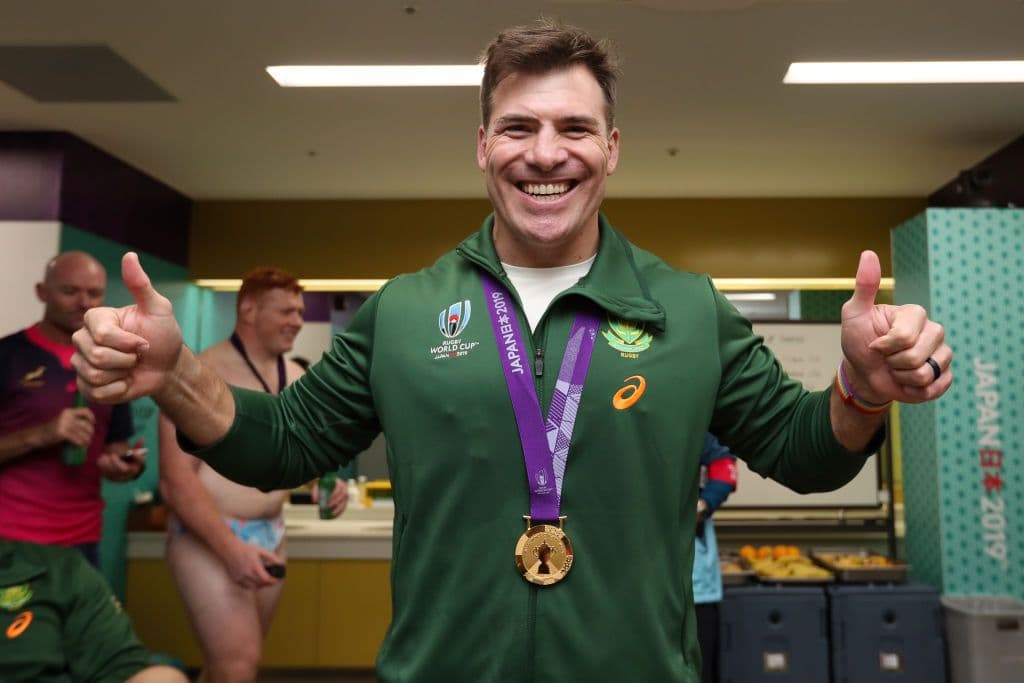Rugby
Exclusive: Schalk Brits on How Rassie Erasmus and the Springboks Inspired a Nation Through Rugby
Schalk Brits, a former Saracens legend and key player in the 2019 Rugby World Cup-winning Springbok team, reflects on the team's success and the importance of unity in South Africa. Coach Rassie Erasmus's innovative approach has propelled the team to back-to-back World Cup victories, with Brits emphasizing the transformative power of rugby in the country.

England v South Africa - Rugby World Cup 2019 Final by Gallo Images | Getty Images
Schalk Brits brought puppy dog enthusiasm, older brother guidance and wizardly decision-making to the Springbok team when coach Rassie Erasmus lured him out of retirement to play in the 2019 Rugby World Cup, and the former Saracens legend has great insight into the formative years of a South African team that has now won back-to-back World Cups and continues to set the pace in the global game.
A Return to the Fold: Brits' Unlikely Comeback to the Springboks
Having retired from rugby in 2018 after more than 200 appearances and six major trophies for Saracens, Brits returned to the Springbok team later that year, three years after the last of his five previous Test caps.
One of the most popular players produced by South Africa and with valuable wisdom gained from his many successful years in the northern hemisphere, Brits was tasked with leading the ‘dirt-trackers’ at the 2019 World Cup and ensuring the broader squad stayed unified.
It was a job he performed superbly, although Brits himself is humble about his role. But he is happy to pinpoint what the secret ingredient of the Springboks is, and why they continue to dominate international rugby six-and-a-half years after Erasmus took over the reins.
The Springboks’ Secret Ingredient: Playing for Something Bigger Than Rugby
“I was only a very small speckle in the build-up to where the Springboks are now and it’s amazing the way Rassie has innovated and the number of players we now use,” Brits told SportsBoom.com in an exclusive interview at the Gary and Vivienne Player Invitational at Sun City, where the 43-year-old was playing golf to help raise funds for the Players’ pre-primary school for farmworkers’ children on their estate outside Johannesburg.
“There’ve been amazing Springbok sides before, but these players are playing for something much bigger than themselves, they’re playing for hope. There are many ills in South Africa, but the Springboks can transform the country through their diversity. If they can make it work, being made up of people from all walks of life, then we can make our country beautiful.”
From Adversity to Dominance: The Rassie Erasmus Revolution
“Back in 2018, we had come off record losses against Ireland and the All Blacks and we were ranked seventh in the world. We would bitch and moan about a knock-on or a missed tackle, but Rassie said we had no right to moan because people in South Africa were being murdered or were starving. He told us we had to get off our arses and make the next tackle.”
Winning Hearts, Not Just Matches
“Rassie said we could show South Africa that we could work together with our colour, religion or background being irrelevant, we could inspire the next Springbok from our community. We would probably lose a much higher percentage of those one-point games were it not for our ‘why’ being very well determined: It’s not about rugby for us, it’s about giving hope to 65 million people.”
“Rassie said the best way to do that was not by posting stuff on social media but by going on the pitch and showing it there,” Brits said.
Attacking Flair and Depth: A Look at the Springboks’ Recent Tour
On the debate over whether the Springboks are currently the best team in the world, Brits said Erasmus’s focus has always been on the World Cup.
“Winning against Scotland, England and Wales on the recent tour is important, but for Rassie there’s a bigger plan. So, he will keep rotating, which puts the players under pressure and gives the team depth.”
“People don’t remember who the number one team is in the world every year, but everyone remembers who wins the World Cup. I would definitely rather win the World Cup. It must be terrible to be Ireland – they’ve been ranked number one but they could not even get a semi!” Brits said with his trademark broad grin.”
The man who many discerning judges believe could have played in the backline thanks to his silky ball skills, was also impressed by the attacking verve shown by the Springboks in the United Kingdom last month.
“Against Scotland, it was a very open game, and we were able to run the ball. England tried to match us with Marcus Smith and Wales have a new bunch of guys and they are rebuilding. So it was exciting to see the way we went unbeaten through an end-of-year tour for the first time since 2013,” Brits said.

Ken Borland is a freelance sports journalist and commentator based in Johannesburg, South Africa. His specialities are cricket, rugby, golf and hockey (he’s the winner of an SA Hockey Association Merit Award), but he has occasionally ventured further afield from these main sports!
Although sport is his job and something he loves, he is also passionate about the outdoors, wildlife and birding; conchology; music and collecting charts; movies; and his faith.